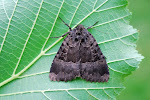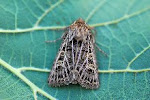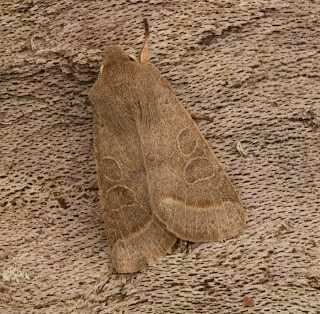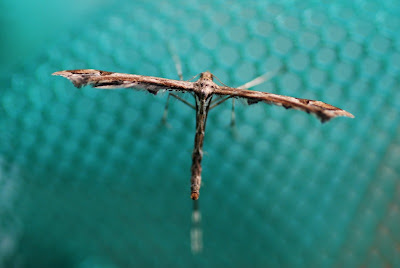"My mothing area lies south of Chiddingfold and almost in sight of the Sussex border. I started trapping a couple of years ago because once the butterflies had disappeared I was faced with several months with nothing to see before they returned with the spring. There is only so much excitement that can be generated by the sight of a solitary Red Admiral on a sunny winter's day.
Exactly a year ago I took 220 Small Quakers (Orthosia crudain) in my Heath trap with a 20w actinic bulb and over 100 in a Robinson. So far this year I've managed to take just 1 in about 10 nights trapping.
Several of the usual suspects have appeared, the micro moth Tortricodes alternella commonly turns up, always making me think that at least one of the specimens taken should be something else and no matter what I do always too lively to pose for a photograph. Maybe for this photo of a Yellow-Horned (Achlya flavicornis) I should have taken a head-on police mug shot but he showed every indication of also wanting to escape.
I have a soft spot for the Brindled Beauty because it is the first moth that I ever photographed in its natural setting and so much more colourful in daylight (Lycia hirtaria)
Small Brindled Beauty (Apocheima hispidaria)
But a more frequent visitor to the trap in January was the Pale Brindled Beauty (Phigalia pilosaria)
There have been a smattering of rather worn Chestnuts (Conistra vaccinii) the darker forms of which tempt me to identify them as Dark Chestnut (Conistra ligula). Maybe I'll be lucky enough to have one of each one night so that I can see the difference in the wing shape. The March Moth (Alsophila aescularia) has appeared in small numbers on several nights.
With a little luck and if the forecast is to be believed I might get another night suitable for trapping before the end of the month and now that the Field Guide to the Micro moths of Great Britain and Ireland has been published as well as the Smaller Moths of Surrey, I almost look forward to a micro moth or two"
John R
Many thanks to local trapper, John, for sharing his brilliant early season catches.
Showing posts with label small quaker. Show all posts
Showing posts with label small quaker. Show all posts
Wednesday, 20 March 2013
Tuesday, 28 February 2012
Quiet night last night
Cloudy but not Drab
Nothing to right home about last night, but it was great to get two more true spring species, Clouded Drab and Small Quaker.
.
27th Feb:
3 Chestnut
2 Clouded Drab NFY
1 Pale Brindled Beauty
1 Small Quaker NFY
.
Clouded Drab

Small Quaker

Sunday, 26 February 2012
More than I bargained for!
Like others, I've been taking advantage of the very unseasonal weather to pop the moth trap out in the garden. To be honest, I didn't expect to be as successful as I have been, with a total of 15 species recorded (and god knows how many individuals!) over the past 3 days, bringing the 2012 garden moth list to 20... a figure that wasn't reached until 22nd March last year. Perhaps a sign of things to come?
Here's the list so far:
Dark Chestnut
Chestnut
March Moth
Common Quaker
Small Quaker
Clouded Drab
Small Brindled Beauty
Pale Brindled Beauty
Winter Moth
Spring Usher
Tachystola acroxantha
Epiphyas postvittana
Carpatolechia decorella
Ypsolopha ustella
Tortricodes alternella
Amblyptilia acanthadactyla
Emmelina monodactyla
Agonopterix heracliana
Mompha subbistrigella
Acleris cristana
Small Quaker, 1 of 3...
Small Quaker w/ big brother, the Common Quaker...
Spring Usher...
March Moth...
Small Brindled Beauty, the most numerous moth in the trap at present...
Pale Brindled Beauty, a belated garden first...
A gang of 'Beauties'...
Clouded Drab...
Dark Chestnut, a first for the garden...
Carpatolechia decorella...
Mompha subbistrigella...
Emmelina monodactyla...
Here's the list so far:
Dark Chestnut
Chestnut
March Moth
Common Quaker
Small Quaker
Clouded Drab
Small Brindled Beauty
Pale Brindled Beauty
Winter Moth
Spring Usher
Tachystola acroxantha
Epiphyas postvittana
Carpatolechia decorella
Ypsolopha ustella
Tortricodes alternella
Amblyptilia acanthadactyla
Emmelina monodactyla
Agonopterix heracliana
Mompha subbistrigella
Acleris cristana
Small Quaker, 1 of 3...
Small Quaker w/ big brother, the Common Quaker...
Spring Usher...
March Moth...
Small Brindled Beauty, the most numerous moth in the trap at present...
Pale Brindled Beauty, a belated garden first...
A gang of 'Beauties'...
Clouded Drab...
Dark Chestnut, a first for the garden...
Carpatolechia decorella...
Mompha subbistrigella...
Ysolopha ustella...
Emmelina monodactyla...
Not exactly a moth, but the thin crescent of the moon was looking nice on Friday night...
Happy mothing!
Saturday, 26 February 2011
Fabulous February
Since my last post, I've caught plenty more early spring gems...
On the 23rd, along with the regular seasoning of Common Quakers, March Moths and Hebrew Characters, I caught a welcome 3 Twin-spotted Quaker. The variation between them was interesting, especially an individual which hosted 7 spots on each wing, and not the usual 2! After looking in the 'Larger Moths of Surrey' atlas, Collins describes specimens with increased spotting as rare in Surrey...
The usual form...
On the 24th, I moved the 15w actinic to the other end of the garden, with a sheet behind it to reflect the light to all areas of the garden.
It paid off and I caught 4 new species for the garden; Small Brindled Beauty, Small Quaker and an individual of each Amblyptilia acanthadactyla and Agonopterix sp.- the latter of which to me looks very promisingly like A. scopariella- Only 6 sites appearing to be shown on the provisional micro distribution maps for Surrey. Photo send to CR for identification.
Small Brindled Beauty...
Small Quaker and Common Quaker (and to think I was previously afraid of how I would seperate the two species should I ever catch them!)...
Amblyptilia acanthadactyla
On the 23rd, along with the regular seasoning of Common Quakers, March Moths and Hebrew Characters, I caught a welcome 3 Twin-spotted Quaker. The variation between them was interesting, especially an individual which hosted 7 spots on each wing, and not the usual 2! After looking in the 'Larger Moths of Surrey' atlas, Collins describes specimens with increased spotting as rare in Surrey...
The usual form...
On the 24th, I moved the 15w actinic to the other end of the garden, with a sheet behind it to reflect the light to all areas of the garden.
It paid off and I caught 4 new species for the garden; Small Brindled Beauty, Small Quaker and an individual of each Amblyptilia acanthadactyla and Agonopterix sp.- the latter of which to me looks very promisingly like A. scopariella- Only 6 sites appearing to be shown on the provisional micro distribution maps for Surrey. Photo send to CR for identification.
Small Brindled Beauty...
Small Quaker and Common Quaker (and to think I was previously afraid of how I would seperate the two species should I ever catch them!)...
Amblyptilia acanthadactyla
I'll post the outcome of the mystery micro, as well as a mystery Chestnut sp. that I'm also in the process of IDing, and a Clouded Drab that I haven't had to photograph, in due time... moth trapping is a busy process!
Friday, 25 February 2011
More early moths
This mild spell has clearly got the moths out - I've had one or two that I wouldn't normally expect to see in February.
small quaker

small brindled beauty

shoulder stripe

oak beauty

larva of large yellow underwing (Noctua pronuba)

common quaker

small quaker

small brindled beauty

shoulder stripe

oak beauty

larva of large yellow underwing (Noctua pronuba)

common quaker

Subscribe to:
Posts (Atom)






.JPG)
.JPG)






































